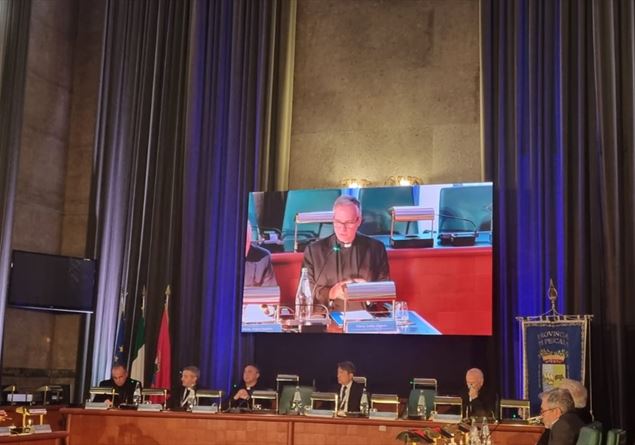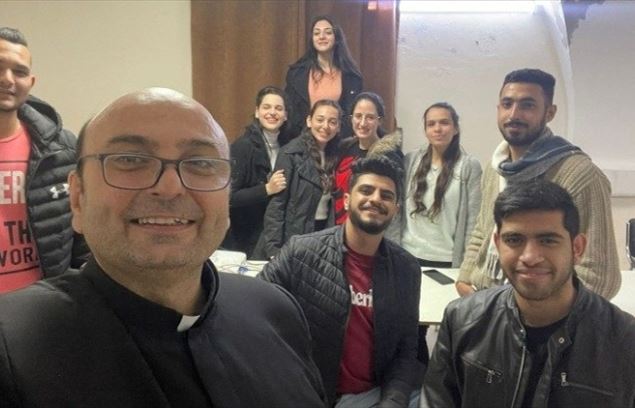
It’s 1957. Kwame Nkrumahthe first president of independent Ghana and a symbolic figure of Pan-Africanism, speaks at a meeting of university students in the German city of Freiburg. «The person who introduced me said that I am responsible for the reawakening of this great continent», he begins. «I believe that is not true: if we want to consider the situation more precisely, I must say that those responsible for raising awareness of our dignity as Africans were the Christian missionaries with their schools”. Words that were spoken again, almost 70 years later. Quotes in new times, in which we also question the relationships between the global North and South, between the colonized and the colonialists, between those who exploit and those who create opportunities.
We are in the prefecture headquarters in Piazza Italia, in Pescara, the host city in Abruzzo the G7 ministerial meetings dedicated to cooperation and development. Representatives of the major Western powers promise to invest in Africa. And they listen to the voices of the missionaries, thanks to a conference organized by the Minister of Foreign Affairs and International Cooperation Antonio Tajani.
Quoting Nkrumah is Father Giulio Albanese, director of Social Communications of the vicariate of Rome, member of the Council of the section for Relations with States and international organizations of the Vatican secretariat but also and above all a Comboni member, with years of experience in Kenya, Uganda and other countries south of the Sahara. In Pescara he takes part in a meeting dedicated to “training for development”, an opportunity for reflections, criticisms and proposals. However, we start from the data. Africa has one and a half billion inhabitants, with an average age of around 20 years. It is a bit like the future of the world and faces crucial challenges: according to the UN and the African Union, south of the Sahara alone 98 million children of school age do not attend institutions. Broadening our gaze to the entire continent, we then discover that 86 percent of pupils have difficulty reading and understanding a basic text before turning ten: a share that has grown with the Covid-19 pandemic and the international fallout of the conflict between Russia and Ukraine.
What to do? Reverse the trend, he replies Monsignor Emilio Nappapresident of the Pontifical Missionary Works (PMS), the Vatican institution for evangelization present in 123 countries around the world. According to the archbishop, in conversation with Christian familyschool is the priority of priorities. It is also discussed in relation to the Mattei Plan, the promising initiative of the Italian Government “cooperation between equals” and “a non-predatory approach” with Africa. «The mission of the PMS is to bring the Gospel where it does not exist or where it has been forgotten; and the Gospel can only be brought after primary needs have been satisfied.” Monsignor Nappa explains: “You cannot listen to the Gospel if there are no pews, a church or a school, and if the right to healthcare is not guaranteed.” The president of the Pontifical Missionary Works adds: «We cooperate to create the context for evangelization to spread, for the human and the Christianized human; this is the vision of the Church, to promote, recognize and defend human dignity everywhere.”
He is also a witness Monsignor Antonio D’Angeloarchbishop of L’Aquila. «The training action is first and foremost about standing by one’s side», he says during the conference. «Don’t go there to say who knows what, but stand beside us, as traveling companions». It is the perspective of sharing that marks the film school project mentioned by Monsignor Dario Viganòvice-chancellor of the Pontifical Academy of Social Sciences. «The initiative started a few years ago, from Algiers to Marrakech, from Tunis to Beirut», he explains. «The courses last 24 months and give skills in screenwriting and directing, with also courses at the UNINETTUNO university and at the Rome Film Festival in the youth section “Alice nella città”». According to Monsignor Viganò, it is a question of «allowing the meeting between the skills of Italy and the sensitivity of the various countries of origin, encouraging integration and giving rise to interesting innovations».
Small stories, a sign of hope in a larger and more complex world. Perspectives which, in Pescara, are next to each other. Here then Antonio Tajani: «If we have an Italian foreign policy that is strongly present in Africa we also owe it to the work of the missionaries, who are Italian and Italian, who speak Italian and who lead by example.” However, at the center of the conference there are also injustices and betrayed promises, such as the one made at the UN over 50 years ago and never kept to bring public development assistance to at least 0.70 of the gross domestic income of the richest countries.
“Cooperation is of little or no use without a commitment against the systemic mechanisms that exacerbate and determine poverty in Africa”, continues Father Albanese. His reference is to the “vexed question” of public debt. «From the global crisis onwards», denounces the Comboni missionary, «African countries have replaced low-cost multilateral debt with another contract with hedge funds and private equity, which is much more onerous and short-term». According to this analysis, «the debt has been financialized and the higher cost of its service has meant that in Africa the figure of 1,200 billion dollars has been reached, compared to a continental GDP that is not worth more than 3,000 billion». The result? «The lack of infrastructure and also of schools». Hence the “pressing appeal” of the “missionary world”. It is contained in a document delivered during the conference to Tajani and the Italian presidency of the G7. «We must support educational initiatives on the vast African continent», we read in the text. «It is a macro-region with extraordinary potential, not only material, but above all human and spiritual».
(Photo by Vincenzo Giardina)






